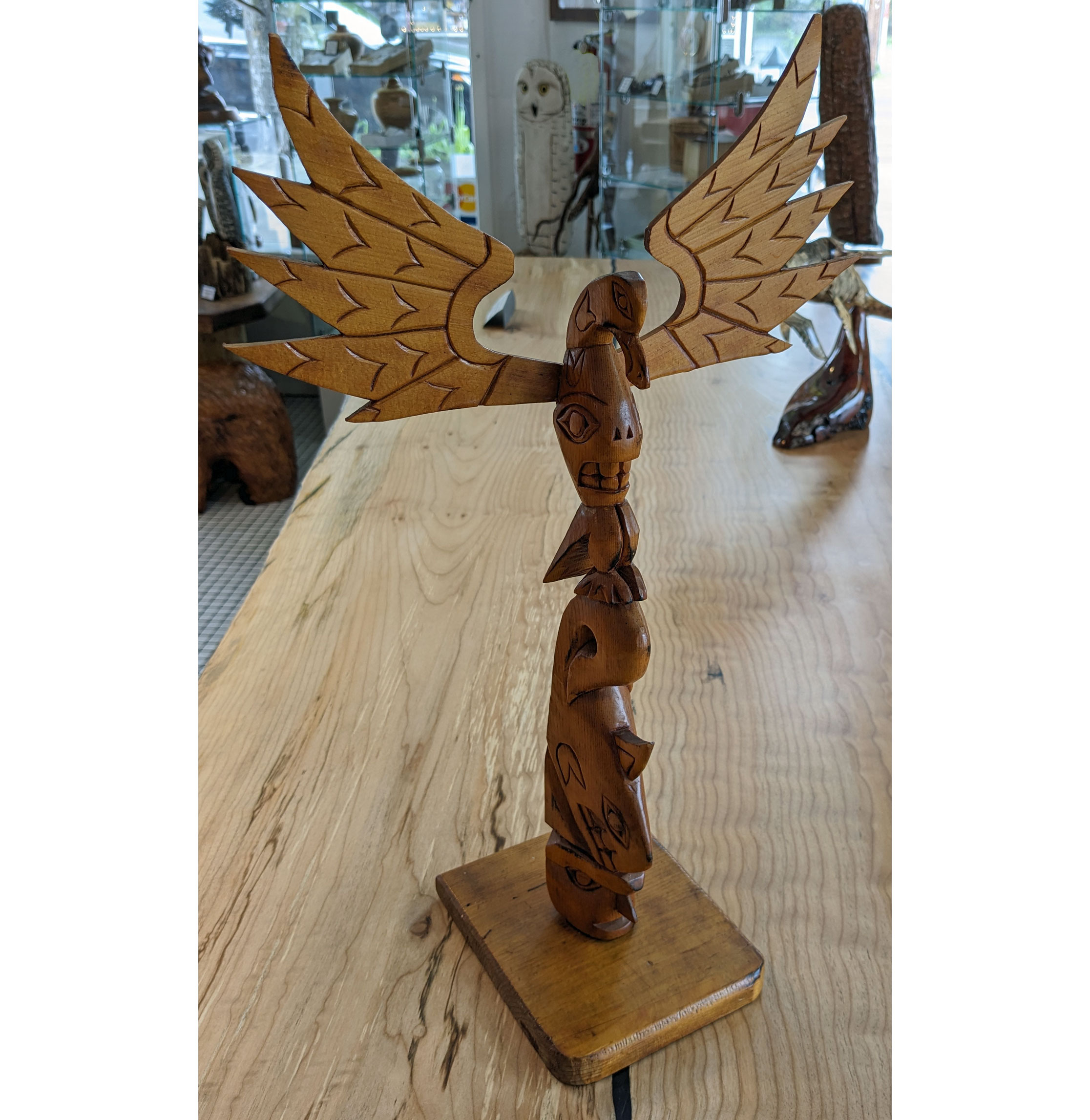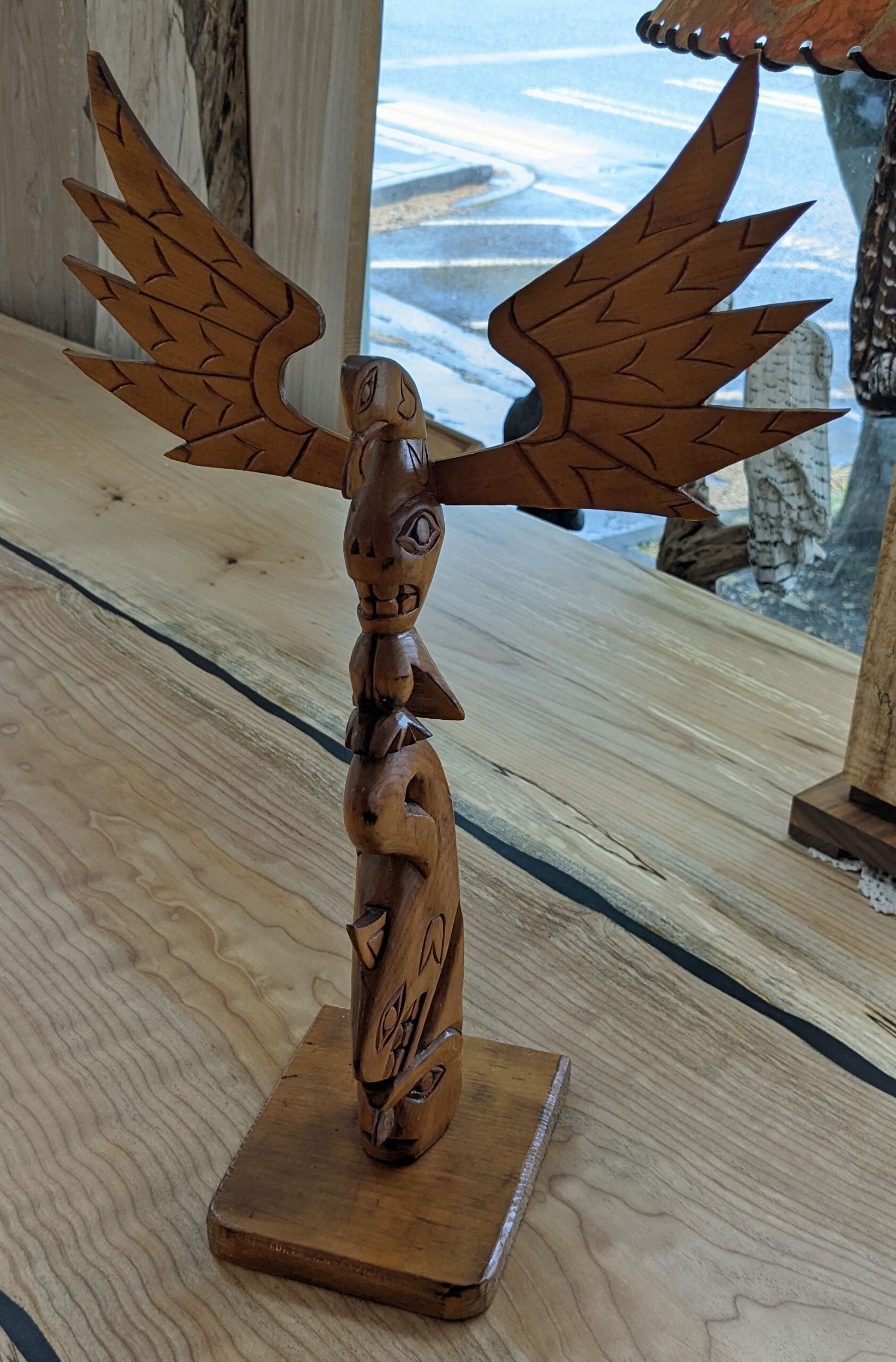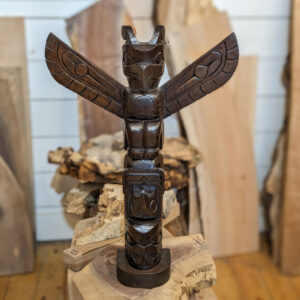First Nations Thunderbird and Orca Totem
$425.00
Beautiful vintage yellow cedar carved totem pole measures 19 x 11 x 7. It features the triumphant spread wings of the Thunderbird clutching the Orca, whose tail flukes are flipped forward. Priced at $425.
Check out the photos for details of the carving. This is a classic form that fakers often try to copy, but this vintage piece is authentic, and it signed by the artist.
The artist was born in 1040 a village near Nitinaht, where his people have lived for centuries, with no doctors present. Nitinat Lake is a large lake and inlet on the southwestern coast of Vancouver Island. His name was passed down from his Grandfather, although in traditional Nuuh Chah Nulth language, his name translates to “everybody is talking about me”. He passed away in 2019.
Growing up, no English was spoken in his home. The artist did not attend school, but learned everything he knows from his Grandfather, who was a whaler in his village. He taught his grandson how to carve harpoons with mussel shell spears to hunt whales, and paddles for their canoes. At the age of two, the artist composed his first song, which led to a lifetime of singing, dancing, and carving.
The artist spent decades teaching the youth in the same village where he was born their traditional language, culture, and history. He built long houses, canoes, and other artwork that has been purchased by collectors and museums around the world. He was invited to potlatches across the Nuuh Chah Nulth Nation to sing and dance and tell stories.
Jimmy has 10 children, 25 grandchildren, and 15 great grandchildren, whom he has passed down all of his knowledge to. Many of his family are now well-established artists who accredit their talents to the wisdom and teachings of Jimmy.
The Nuu-chah-nulth, also formerly referred to as the Nootka, Nutka, Aht, Nuuchahnulth or Tahkaht, are one of the Indigenous peoples of the Pacific Northwest Coast in Canada. The term Nuu-chah-nulth is used to describe fifteen related tribes whose traditional home is on the west coast of Vancouver Island.
In the 1980s, geologists found evidence that an earthquake, powerful enough to send a tsunami all the way to Japan, hit the American Pacific Northwest in 1700. Some ethnologists believe that “Thunderbird and Whale” legends may be a description of that disaster. (More info on Wikipedia about that event can be found at https://en.wikipedia.org/wiki/1700_Cascadia_earthquake)
One such narrative is a recurrent battle between Thunderbird and the “Mimlos-Whale”, an orca that repeatedly escapes to sea after capture, and this struggle resulted in great tremors in the mountains and leveling of trees, offering a mythic explanation of the origin of the Olympic Peninsula prairies.
The myth of the epic struggle between Thunderbird and Whale is found in common among different language/cultural groups of the Indigenous peoples of the Pacific Northwest Coast of America, and seems to be uniquely localized to this area. It is also the major archetypal motif in carvings and painted art, particularly among the natives along the outlying coasts of Vancouver Island, e.g., the Kwakiutl (Kwakwakaʼwakw) or the Nootka (Nuu-chah-nulth) people.
One Quileute version can be summarized as follows:
Whale was a monster, killing other whales and depriving the Quileute tribe of meat and oil. Thunderbird, a benevolent supernatural being, saw from its home high in the mountains that the people were starving. It soared out over the coastal waters, then plunged into the ocean and seized Whale.
Thunderbird eventually succeeded in lifting Whale out of the ocean, carrying it high into the air and then dropping it. A struggle ensued; the ocean receded and rose again. Many canoes were flung into trees and many people were killed.








